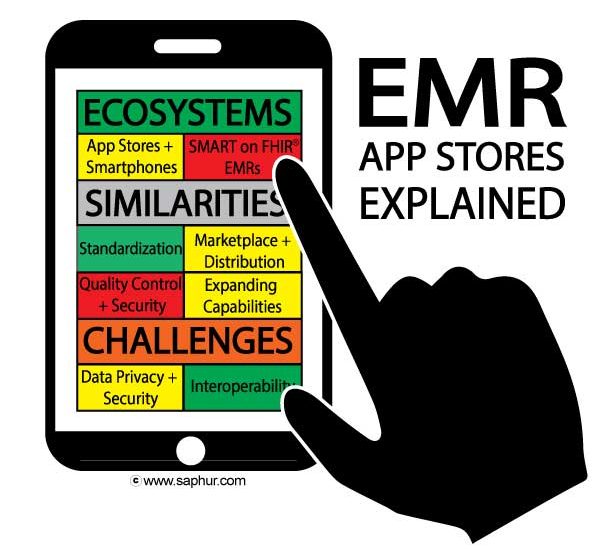Introduction
In the past decade, app stores transformed the way we interact with our smartphones, turning them from mere communication devices into multifunctional tools. The healthcare industry is undergoing its own transformation with the integration of third-party apps into Electronic Medical Records (EMR) systems, notably through the SMART on FHIR® framework on platforms like Epic.
Understanding the Ecosystems
a. App Stores and Smartphones
Smartphone app stores, such as Apple’s App Store or Google Play, have been pivotal in maximizing the potential of smartphones. For developers, these platforms offer a standardized environment, potential for revenue, and access to a global audience. Users, on the other hand, benefit from a vast selection of applications, seamless updates, and security assurances.
b. SMART on FHIR® and EMRs
In the healthcare realm, EMRs have grown into comprehensive platforms. SMART on FHIR®, which stands for Substitutable Medical Applications, Reusable Technologies on Fast Healthcare Interoperability Resources, has emerged as the gold standard for developing and integrating healthcare apps. Providers can enhance their services, while developers have an entrance into the expansive healthcare market and a standard protocol.
Key Similarities Between the Two Ecosystems
a. Standardization
Both ecosystems have emphasized standardization. Just as iOS and Android have defined norms for mobile app development, SMART on FHIR® prescribes the integration of health apps with EMRs, ensuring consistency and compatibility.
b. Marketplace and Distribution
Apple’s App Store or Google Play Store serve as central hubs for smartphone users. Similarly, platforms like Epic’s App Orchard act as repositories where healthcare providers can discover and integrate novel health apps.
c. Quality Control and Security
All apps on smartphone stores undergo rigorous testing and vetting, ensuring functionality and security. EMR platforms are stringent about the apps they accept, given the sensitive nature of health data.
d. Expanding Capabilities
Apps on smartphones have expanded functionalities far beyond calls and texts. Similarly, SMART on FHIR® apps allow EMRs to venture beyond traditional record-keeping, offering advanced analytics, telehealth functionalities, and more.
Challenges and Considerations
a. Data Privacy and Security
Data breaches are a significant concern in both ecosystems. While app stores and EMRs take measures to ensure security, the potential for breaches always exists, emphasizing the need for ongoing vigilance.
b. Interoperability
Despite the promise of interoperability with SMART on FHIR®, seamless data exchange across various EMR systems remains a challenge, much like cross-platform compatibility in the smartphone world.
Conclusion
Will the EMR app ecosystem emulate the trajectory of smartphone app platforms? Only time will tell. However, one thing is clear: integration and interoperability are paramount to the future of healthcare technology.





